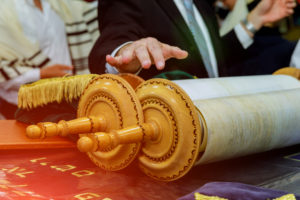
By Rabbi Eric Yanoff
Parshat Re’eh
I spent the past several weeks teaching young adults at Camp Ramah in the Poconos and was reminded again: Jewish camp is one of Jewish America’s greatest inventions, not only because of the lifelong Jewish identity it fosters among campers and staff.
Each summer (with the notable exception of summer 2020), camps like Ramah build a brief, recurring Brigadoon, a Jewish utopian society of menschlichkeit that reminds us how to be our best with one another. This summer, coming out of an extended time of isolation, we needed this more than ever.
Yes, the overt Jewish lessons at camp are fun and memorable: I taught our teens midrashim on how (and how not) to reach heaven, while on the ropes course, stories of Moses on Mount Sinai and the Tower of Babel. I taught Talmudic stories of friendships that began in the middle of a body of water — as we rowed out to the middle of the agam (lake).
But the best moments are the ones that happen with no preparation: The dozen staff and campers who sprint to the aid of a child who dropped her food in the chadar ochel (dining hall), quickly cleaning up the mess, brushing off the camper, refilling the plate and helping her to her table, all before she even has time to be embarrassed — because that smiling group has named themselves “The Rachmanus (compassion/care) Brigade.”
… The “fourth strike” given to the camper who really needs a hit that day on the softball field, as both teams silently forego the “no-fair” objection … The triumphant last child who passes the swim safety test … the overenergetic, 100-person line dance to some Israeli Eurovision pop-song entry … the wild cheers for the winner of the “Schmutz-Buster” T-shirt for helping to make sure camp stays clean …
… The oldest division of campers who decide to make a “cult hero” out of a younger camper who might have been dismissed by his peers as quirky and unrelatable, chanting his name so that his peers will see their bunkmate in the best light, and will embrace him because their role models, older campers, have
embraced him …
Of course, these stories are heartwarming precisely because they don’t have to go this way; there are plenty of stories, both in camp and in the “real world,” where people are not as nice. But when done right, camp is not the real world because it is the place where we can be seen and embraced as precious and beloved — and where we can see ourselves as precious and beloved. In a more-isolated world, it was too easy for too many of us to forget that others see, love and value us in this way.
It reminds me of a moment in this week’s Torah portion, Re’eh, where Moses reminds us how precious we are; he says, “Banim atem — you are God’s children” (Devarim 14:1) — and continues, “[therefore] don’t gash yourselves.” It is a reminder not to harm ourselves bodily in the cultic ways that were prevalent in ancient times, because we are created in God’s image. We are not perfect, but we are infinitely precious, valuable and worthy.
But the Torah does not stop there: In a few weeks, we will read a law about a person who is hanged; we must not leave the body of the criminal hanging overnight (21:23). The biblical commentator Rashi explains that the reason, again, is because we are created in God’s image — but this time, we do not resemble God as God’s children, but rather as God’s twin sibling.
Rashi tells a story of a king who had a lesser-known twin who was a criminal, who was hanged, and passers-by would assume it was the king and would disparage him. So, too, when we act in a way that diminishes our own humanity, we are tarnishing the image of God — and God’s good name is hurt in the process.
This is the reflexive part of being created b’tzelem Elohim, in God’s image: If we are in God’s Divine image — then God is in OUR image. God resembles our very-human, very-imperfect image. We are the imperfect twins of God. We must build a society that reminds us of that responsibility to uphold and not sully God’s image, with our actions.
Especially in today’s amped-up rhetoric, where differences of opinion are often argued not on their merits but rather by vilifying and dehumanizing the other side — where we do not treat someone as mistaken but as evil — we need a reminder that when we delegitimize a person or a people, we are tearing down God’s image. The real world makes it easy to forget the lesson that we must preserve the image of God.
In five weeks, at the High Holidays, the Unetaneh Tokef (“Who will live, who will die”) prayer will conclude, “U-sh’meinu karata vi-Shmecha — You have linked our name with Yours.” God is counting on us to honor God’s image, by valuing others, who carry God’s Image as our own.
Let’s not wait until next summer to build such a better world; let’s begin right now. l
Rabbi Eric Yanoff is one of the rabbis at Adath Israel in Merion Station and an immediate past co-president of the Board of Rabbis of Greater Philadelphia. The board is proud to provide diverse perspectives on Torah commentary for the Jewish Exponent. The opinions expressed in this column are the author’s own and do not reflect the view of the Board of Rabbis.





